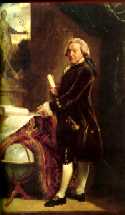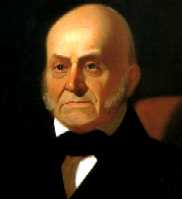

 |
|
 |
Many view the deterioration of the enormous classical influence in American society with sorrow, while others see it as a natural occurrence of change throughout the centuries that need not be mourned. The Adams family provides support for both of these opinions. Were John Adams alive today, he would most definitely lament the passing of antiquity out of style, because he so completely admired and used the classics throughout the personal and public aspects of his life. Without Cicero’s influence, as Farrell points out, John’s defense of the British soldiers in the Boston Massacre trials may not have been so eloquently thorough and successful. Perhaps his "Novanglus" essays would have lacked the conspiracy rhetoric that so completely captured the clash between the Tories and the Whigs in Massachusetts. For a man who felt physically invigorated when he read his favorite classical author the way John Adams did, the waning of the classics was something he would have been crestfallen over, as seen in his expression of distress to Benjamin Rush over the threat posed against classical education.
Yet for John Quincy and Abigail Adams, moving away from the classics meant moving forward on a distinctly modern American path. John Quincy truly followed the path laid out before him by his father, and in so doing he came to love the classics, but to a lesser degree. He deviated from tradition as a classics professor at Harvard, and he looked to more contemporary sources in his address at the Amistad trial and his "Publicola" essays. Though these contemporary sources had looked to the classics for their inspiration, John Quincy often did not, and he allowed the pressing business of United States politics to interfere with his often-frustrating study of antiquity. But the reasons behind this lapse in John Quincy’s classical influence are not too surprising or too discouraging. John Quincy Adams had a role model much closer to home than those of Greece or Rome—his father. He represents the first generation of Americans that could look to the young country’s newborn history to find true patriots and democratic heroes such as George Washington, Thomas Jefferson, and John Adams.
Abigail’s opinion against classical education was the first in a long struggle for women’s rights in the United States, and although antiquity took quite a hit from these early feminists, modern women benefit from the overall message of equality in education. Unfortunately, the classics fell victim to an accusation that should have been made against education in general, because antiquity was education in general during Abigail’s lifetime. Educational inequality among the sexes was just one in a long line of reasons why the classics deteriorated throughout the nineteenth century in America, however. With the growth of American politics, industry, and history, the country’s educational needs changed and its history became rich and interesting, leaving the classics sadly in the dust.
Today, however, the classics have become a part of American history, as this study of the Adams family has shown. John, John Quincy, and Abigail reflect three very different and interesting viewpoints on antiquity in early America, and whether they admired or despised them, the classics affected nearly every aspect of their lives. Classical role models provided the inspiration for John Adams and his colleagues to undertake the American Revolution and forge a new nation that stands today as a pillar of democracy, liberty and personal freedom. Antiquity made it possible for John Adams to become a hero to his son John Quincy, and to millions of others who admire the courage it took to achieve freedom. And, finally, without the classics, Abigail Adams may not have had the examples she needed to further her fight for equality, which she found in Greek and Roman history, nor would she have had a target for her frustrations and anger. There is no disputing the vast influence of antiquity in early American society, and within this one great family we find a multitude of classical expressions, opinions and disagreements.